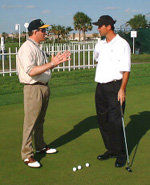
Golfers: Use Healthy Self-Talk
Does your self-talk help or hurt you during a round of golf? The battle in your mind can be brutal on the golf course.
Internal conversations can be helpful or harmful depending upon the content and tone of your self-talk.
Recently, a golfer sent us a question about self-talk from our Golf Mental Game Survey:
“How can I stop beating myself up and stay calm after I hit a bad shot so I can focus on my next shot?”
Often, when you hit a bad shot, a slew of negative thoughts bombards you. You experience an internal monologue listing everything you did wrong and reasons why you should never step foot on another golf course; “Will I ever hit a straight drive? I’m an embarrassment.
I play one hole well, then I follow up with three bogeys. I’ve left most of my putts short. Not one part of my game is any good.”
When negative self-talk takes over, it is difficult to focus on anything else, let alone concentrating on playing your current shot the best you can.
The solution is to turn the self-critical monologues into objective self-dialogue.
The objective self-dialogue is your counter argument or effective self-talk to combat your self-critical thoughts. Engaging in healthy objective self-dialogue can get you back on track and focusing on playing your game to the best of your abilities.
An example of a healthy, objective self-dialogue
“I’ve been driving the ball well all week long. I can get back on track. Focus on just this shot, one shot at a time. If I’m a bit more aggressive on the greens I can make up some strokes. I’ve done it before; I can do it again.”
When you engage in constructive internal dialogue, you will calm your mind
and body and enhance your ability to stay in the present.
Jessica Korda, winner of the 2021 Diamond Resorts Tournament of Champions, battled with her self-talk on the final day of the tournament.
Early in the final round, Korda appeared frustrated but was able to refocus and win the tournament.
KORDA: “I didn’t have great numbers all day. I was in between shots all day. It was just frustrating because I wanted to be aggressive, but then I wasn’t. And then kind of just said, ‘You know what? Forget about it. Just stick to your process and be aggressive when you can and take those opportunities.’”
You can feel the push and pull of her thought process. Through effective self-dialogue, Korda was able to re-focus on her process in the moment.
Don’t allow a negative internal monologue to take control of your mind. When you debate those thoughts, you can clear your mind and immerse yourself in your game.
Healthy Self-Talk for Peak Golf Performance:
Start paying attention to the content and tone of your thoughts. Conduct a reality check by asking yourself questions about your self-talk.
“Is it really true I am a horrible golfer or did I just have a few bad holes?”
“Is it true I can’t sink a putt? I sunk a couple of long putts earlier in the round.”
Catch yourself in the act of negative self-talk after bad shots. Be aware! Change self-talk by asking yourself: “How should I think about this to help me feel more confident right now?”
Related Golf Psychology Articles
- Does Your Self-Talk Help or Hurt Your Golf Game?
- Are High Expectations Good or Bad for a Golfer?
- How to Optimize Pressure for Peak Golf Performance
- Subscribe to The Golf Psychology Podcast on iTunes
- Subscribe to The Golf Psychology Podcast on Spotify
Golf Mental Coaching Programs

All golf psychology programs include the Golfer’s Mental Aptitude Assessment (GMAP), a custom Mental Game Plan, weekly coaching sessions, unlimited email correspondence, and The Golfer’s Mental Edge 2.0 workbook program.
One-on-one mental coaching is the fastest and most effective method to improve your mental game, boost your performance, and make lasting changes!
We have unique mental coaching programs, customized for you. Please contact us with any questions your have about our programs. Provide your name, email, and role below:
Or Call us today at 888-742-7225 | Mental Game Success Stories